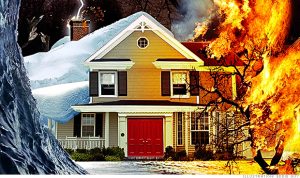What You Need to Know About Homeowners Insurance
Homeowner’s insurance gives you peace of mind that your personal belongings and property are protected in the event of damage and loss, and is also meant to prepare for those unforeseen accidents and emergencies. It is extremely beneficial to have homeowners insurance to replace personal property and/or defend against a liability suit. For example, if a tree falls on your roof, a fire destroys your kitchen, or a friend injurers himself/herself slipping on your rug, the insurance policy pays for your loss when you file a claim.
How Does Homeowner’s Insurance Work?
Your home insurance can help pay for many costly problems including:
• Damage to the building you live in or to other structures (such as sheds or garages) on your property.
• Improvements you have made, such as appliances or fixtures, that are considered part of your residence.
• Fire or lightning
• Power outage.This benefit is often limited to your personal property coverage amount and may be even lower for items such as spoiled food.
• Wind or hail. Wind and hail are among the most common and costly insurance claims.
• Theft. Your tangible personal property is covered by hour home insurance (liability), but there are limits on reimbursement for money, bank notes, gold, silver and other items.
• Dwelling coverage is based on replacement cost of the home NOT market value. Replacement cost includes the cost to demolish and remove the existing structure.
Be sure you have enough homeowners insurance to rebuild a house of similar quality and/or replace your belongings in the event of a serious disaster. There are different Homeowners Insurance Coverage options.
Common Personal Property Coverage Levels:
• Actual cash value: Replaces possessions at their current value, deducting depreciation for items you have owned for a long time, up to your policy limit.
• Replacement cost: Covers the current cost of replacing your possessions, without any depreciation deduction, up to your policy limit.
• Guaranteed replacement cost: Covers the current cost of replacing your possessions, without any depreciation deduction, up to about 20 percent above your policy limit.
Generally, personal property is covered between 40 and 75 percent of your structure’s rebuilding value.
Home Insurance Add-Ons
Beyond standard homeowner’s coverage, you may consider buying separate insurance for the following:
• Flood insurance is a separate policy that protects against flooding. Most people in Illinois only carry flood insurance if/when the mortgage company requires it.
• Sump Pump/Sewer Back Up coverage protects against water damage due to sump pump failure or sewer back up due to excessive rains. Often, the coverage is a separate rider added to your policy.
• Valuable articles coverage provides additional coverage for your “valuable possessions” such as jewelry, art work, collector items (stamps, coins, guns, etc.). The added coverage allows coverage of the item, such as a ring with no deductible. An appraisal may be required for items over $10,000 value. I highly recommend keeping a receipt or having an appraisal done and kept outside of the home.
Renters and Landlords
Today’s renters may find that they are required to buy renters insurance as a matter of course, and it’s not a bad idea to protect your personal property even if you aren’t responsible for the structure of your dwelling.
• Renters Insurance covers personal possessions and liability. This includes losses due to fire, theft, etc.
• If you are a landlord, require your tenants to carry rental insurance. In doing so, this can protect you (the Landlord) from having to file a claim against your own policy. If the tenant has coverage, the claim will first go through their coverage. A perfect example is dog bite claims. If the renter has insurance the claim will be paid by their insurance company. If they do not, the claim will be paid by the Landlord.
There are so many different factors to consider for a Homeowners Insurance policy and what is best for you, your family and your assets. Contact me to learn more about how to save on your home insurance, list of discounts worth pursuing, including bundling your home and auto insurance.
Tips to Protecting Your Home and Your Possessions
Having an up-to-date home inventory of your valuables will help get your claim settled faster. You can do it the old-fashioned way, with a pen and paper and make a list of all items, or there are now mobile apps that are available that can easily help you create and store records of all of your belongings.
Some inexpensive recommendations are Nest Egg for iOS or Sortly for Android, iOS and web). Some apps also allow you to store images of purchase receipts to record the original value of the item.
